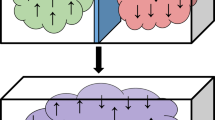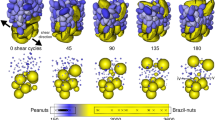Abstract
LORD RAYLEIGH, in NATURE, December 19, 1912, has again returned to the subject of breath figures, and his criticisms of my work on that subject call for some remarks. Lord Rayleigh holds that clean glass will give a uniform deposit of dew when breathed on, and will look black, to use his expression, and show the colours of thin plates when property lighted. I, on the other hand, think that the character of the deposit is generally determined by the impurities on the surface of the glass, because the appearance of the deposit depends very much on the treatment the surface may have previously received. I came to this conclusion because there seems to be no way of finding out what the deposit is like on clean glass, as we have no means of knowing whether the surface is clean or not.
This is a preview of subscription content, access via your institution
Access options
Subscribe to this journal
Receive 51 print issues and online access
$199.00 per year
only $3.90 per issue
Buy this article
- Purchase on Springer Link
- Instant access to full article PDF
Prices may be subject to local taxes which are calculated during checkout
Similar content being viewed by others
Author information
Authors and Affiliations
Rights and permissions
About this article
Cite this article
AITKEN, J. Breath Figures. Nature 90, 619–621 (1913). https://doi.org/10.1038/090619c0
Issue Date:
DOI: https://doi.org/10.1038/090619c0
This article is cited by
-
Single-Step Pore-Selective Silver-Functionalized Honeycomb-Patterned Porous Polystyrene Film Using a Modified Breath Figure Method
Macromolecular Research (2021)
-
Dew inspired breathing-based detection of genetic point mutation visualized by naked eye
Scientific Reports (2014)
-
The gas–liquid tunable self-assembly properties of rod–coil diblock copolymer: donor–acceptor alternating structure served as rod segment
Colloid and Polymer Science (2011)
Comments
By submitting a comment you agree to abide by our Terms and Community Guidelines. If you find something abusive or that does not comply with our terms or guidelines please flag it as inappropriate.



